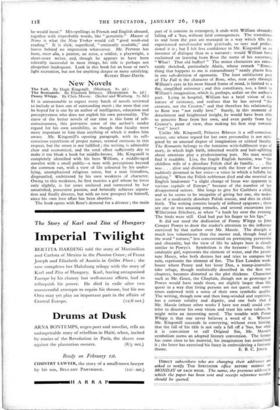New Novels
The Fall. By Hugh Kingsmill. (Methuen. 8s. 3d.)
IT is unreasonable to expect every batch of novels reviewed to include at least one of outstanding merit ; the most that can be hoped for is one by an author of intelligence, education and perceptiveness who does not exploit his own personality. The curse of the better novels of our time is this form of self- consciousness, this pervasive sense of the author's tender regard for his own sensibility, as though that faculty were more important to him than anything of which it makes him aware. Mr. Kingsmill's opening paragraph, with its self- conscious repetitions of proper names, seemed ominous in this respect, but the omen is not fulfilled ; the writing is admirably clear and economical, and the total effect sufficiently dry to make it too bleak a book for middle-brows. Mr. Kingsmill is completely identified with his hero William, a middle-aged novelist with a small public—a man with perceptions beyond the common run, with a view of life coloured by his under- lying, unemphasised religious sense, but a man friendless, disgruntled, embittered by his own weakness of character. Owing to this weakness, he first marries a girl whom he loves only slightly, is for years enslaved and tormented by her unsatisfied, possessive passion, and belatedly achieves separa- tion and finally divorce, but with no new prospect for himself, since his own love affair has been abortive.
The book opens with Rose's demand for a divorce ; the main part of it consists in retrospect, it ends with William absurdly falling off a 'bus, without fatal consequences. The transitions to and from the past are managed in a way which fills the
experienced novel-reader with gratitude, so sure and profes- sional it is ; but I felt less confidence in Mr. Kingsmill as an
inventor of dialogue than as a narrator: would William have exclaimed on learning from Rose the name of his successor, " What ! That old buffer? " The minor characters are enter- tainly sketched, particularly Alaric, whose remark " Every- thing that happens to me is extraordinary " neatly places him in one sub-division of egomania. The least satisfactory pan of The Fall is the character of Rose, who, seen only through William's eyes in his most biased frame of mind, is limited to a flat, simplified existence ; and this constitutes, too, a limit to William's imagination, which is, perhaps, unfair on the author's part. Lying in hospital, William has a brief vision of the nature of existence, and realises that he has served "the creature, not the Creator," and that therefore his relationship to Rose was " not really love." Surely, in this moment of detachment and heightened insight, he would have been able to perceive Rose from her own, and even partly from her Creator's, point of view, thus making his first step towards " real " love?
Unlike Mr. Kingsmill, Princess Bibesco is a self-consciou‘ writer, one whose regard for her own personality is not Miti- gated by an unusual degree of imagination or critical faculty. The Romantic belongs to the feminine wish-fulfilment type of story, in which high birth, inherited wealth and hair-splitting about emotions play a predominating part. No man would find it readable. Lisa, the fragile English heroine, was "the childless wife of a dissolute Polish chef de famille. . . . She was . . . alive and disintegrating with the fever of her unrest suddenly drowned in her voice—a voice in which a lullaby lay lurking." When the Polish nobleman died and she married an English landowner " a slight change of focus was apparent in various capitals of Europe," because of the number of her disappointed suitors. She longs to give Sir Cuthbert a child, and as he seems to be incapable of giving her one, she makes use of a moderately dissolute Polish cousin, and dies in child- birth. The writing consists largely of inflated epigrams ; there are one or two amusing remarks, and several excursions into Wilheimina Stitchery, as when " a hush lay over the evening. The birds were still. God had put his finger to his lips."
It did not need the dedication of Penny Whipp to John Cowper Powys to draw the reader's attention to the influence exercised by that author over Mr. Massie. The disciple is much less voluminous than the master and, though fond of the word " torture," less concentrated on portraying perversion and obscenity, but the view of life he adopts here is closely similar to Powys's. Symbolism is the keynote: Penny, the cataleptic girl, represents the element of water, and the prosti- tute Mercy, who both desires her and tries to compass her ruin, represents the element of fire. The East London work- house where Penny and her lover Dan, a tramp-journalist, take refuge, though realistically described in the first two chapters, becomes distorted as the plot thickens. Characters such as Mr. Goast, the Chaplain, though not as grotesque as Powys would have made them, are slightly larger than life, queer in a way that living persons are not queer, and some- times endowed with a sense of their own symbolic quality. The writing, though now and then long-winded and repetitive, has a certain solidity and dignity, and one feels that if Mr. Massie (whose other works I have not read) could con- trive to discover his own vision and trust his own values, he might write an interesting novel. The trouble with Penny Whipp is that one never believes a word of it. Whereas Mr. Kingsmill succeeds in conveying, without even hinting, that the fall of his title is not only a fall off a 'bus, but what it is convenient to call Original Sin, Mr. Massie's symbolism seems an adopted literary convention. The former has come close to his material, his imagination has assimilated it ; the latter has exercised his fancy in embroidering a fantastic






































 Previous page
Previous page